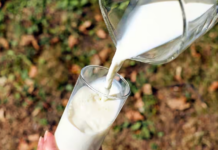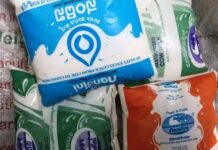New Delhi, June 16, 2021: The Agriculture Department raised its estimate for 2021 and 2022 milk production in the latest World Agricultural Supply and Demand Estimates report, citing higher cow numbers for both years.
2021 production and marketings were estimated at 228.5 billion and 227.4 billion pounds, respectively, up 600 million pounds on both from last month’s estimates. If realized, 2021 production would be up 5.3 billion pounds or 2.4% from 2020.
2022 production and marketings were estimated at 231.1 billion and 230.0 billion pounds, respectively, up 800 million pounds. If realized, 2022 production would be up 2.6 billion pounds or 1.1% from 2021.
Price forecasts for butter, nonfat dry milk and whey were raised, based on recent price strength and stronger anticipated demand, while the cheese price forecast was lowered due to large stocks and current prices.
The lower cheese price results in a lower Class III milk price, now expected to average $17.45 per cwt. for 2021, down 25 cents from what was predicted a month ago, and compares to $18.16 in 2020 and $16.96 in 2019. The 2022 average was estimated at $17.15, up 30 cents from last month’s estimate.
The higher predicted NDM and butter prices support a higher Class IV milk price, which USDA projects at $15.85 per cwt., up a dime from a month ago, and compares to $13.49 in 2020 and $16.30 in 2019. The 2022 average was pegged at $15.95, up 25 cents from last month’s estimate.
GDT dips 1.3%
Powder and butter pulled this week’s Global Dairy Trade auction lower. The weighted average fell 1.3%, the largest decline since March 16. It follows a 0.9% drop on June 1 and is the fifth consecutive loss.
The losses were led by whole milk powder, down 1.8%, following a 0.5% decline on June 1. Skim milk powder was down 1.7% after falling 0.5% last time. Butter was down 1.7%, following a 5.4% decline on June 1.
Anhydrous milkfat inched 0.6% higher after slipping 0.8% last time. Lactose was up 0.4%, after slipping 1.6%, and GDT Cheddar inched 0.2% higher, following a 0.5% rise last time.
StoneX Group says the GDT 80% butterfat butter price equates to $2.0408 per pound U.S., down 3.5 cents, and compares to CME butter, which closed Tuesday at a bargain $1.8050. GDT Cheddar, at $1.9632, was up fractionally, and compares to Tuesday’s CME block Cheddar at $1.5050. GDT skim milk powder averaged $1.5222 per pound, down from $1.5491, and whole milk powder averaged $1.8128 per pound, down from $1.8426. CME Grade A nonfat dry milk closed Tuesday at $1.28 per pound.
Dairy prices mixed
Dairy prices were mixed the second week of June Dairy Month. The Cheddar blocks oscillated some but closed at $1.50 per pound, unchanged on the week but $1.02 below a year ago.
The barrels saw a $1.6725 per pound close Friday, up 5.75 cents on the week, 66 cents below a year ago, and an inverted 17.25 cents atop the blocks. There were 29 cars of block traded on the week at the CME and 23 of barrel.
The blocks inched up 0.50 cents Monday, as traders anticipated Tuesday morning’s Global Dairy Trade auction and Friday afternoon’s May Milk Production report, which many believe will show a large increase. The blocks were unchanged Tuesday, holding at $1.5050, as the markets look for some “fresh direction,” as one analyst put it.
The barrels were down 0.75 cents Monday, following Friday’s 6.50 cents jump, and were offered 0.75 cents lower on Tuesday, falling to $1.6575, 15.25 cents above the blocks.
Midwest cheesemakers remain busy, according to Dairy Market News. Retail cheese demand varies from slow to very busy. Temperatures have begun to signal summertime in the upper Midwest but milk availability suggests spring is not over yet. Spot milk prices ranged $5-$6 under class and cheese plant managers were turning away offers.
Looking westward, retail and foodservice cheese demand held steady last week. The lower prices have reportedly led to increased export demand, with contacts noting interest from Asian markets. Some report difficulty in obtaining transportation and shipping supplies causing delays as well as increased freight costs. Cheese production is strong in the region, says DMN.
StoneX reported concern about the availability or lack of wooden boxes used to ship 640-pound blocks. With the price of lumber having skyrocketed this year, shortages have developed, says StoneX, and “may result in some plants switching up their product mix in the short-term and produce more barrels.”
Spot butter was trading at $1.7925 per pound at Friday’s close, up 1.75 cents on the week but 7.75 cents below a year ago, with 17 sales reported for the week.
Monday’s butter was up 3 cents, with 10 cars changing hands, but it fell 1.75 cents Tuesday on a trade to $1.8050.
Butter demand tones and estimates are similar to pre-pandemic levels, says DMN. Foodservice has leveled off from the pipeline replenishment earlier in the spring but sales are well above last year. Cream is available for Midwestern churners, but plant managers say they are finding it in other areas, primarily the West. Ice cream manufacturers have taken lighter amounts of cream than expected, therefore more is available for churning.
Cream is widely available in the West but movement to other regions is somewhat limited by tanker availability. Some butter manufacturers have reduced output seasonally while others are building stocks for fall demand. Retail sales are lackluster and below pre-pandemic levels. Foodservice demand continues to strengthen but dine-in restrictions are still in place in some states and capacity limits and staffing shortages have restaurants running abbreviated hours and or a limited menu.
Grade A nonfat dry milk finished Friday at $1.30 per pound, 4 cents higher on the week and 29.50 cents above a year ago, on 19 trades for the week.
The powder was up 0.75 cents Monday but dropped 2.75 cents Tuesday, to $1.28, with 8 cars finding new homes.
StoneX stated in its June 8 Early Morning Update: “We know that tightness on milk production is likely to come first and foremost out West where we make a lot of powder.” Very severe drought conditions exist in a huge part of the West.
CME dry whey closed Friday at 62.75 cents per pound, up 2.50 cents on the week and 31.50 cents above a year ago, on 3 sales for the week at the CME.
The whey was down 0.50 cents Monday and dropped 2.25 cents Tuesday, to 60 cents per pound.
Fluid sales down 3.8%
U.S. fluid milk sales continue to struggle. USDA’s latest data shows April sales totaled 3.7 billion pounds of packaged fluid products, down 3.8% from April 2020.
Conventional product sales totaled 3.5 billion pounds, down 3.7% from a year ago. Organic products, at 240 million pounds, were down 4.8%, and represented 6.5% of total sales for the month.
Whole milk sales totaled 1.2 billion pounds, down 10.5% from a year ago, with year to date consumption down 8.0% from a year ago. Whole milk represented 32.4% of total milk sales for the four-month period.
April skim milk sales, at 213 million pounds, were down 11.4% from a year ago and down 14.5% year to date.
Total packaged fluid milk sales for the four months amounted to 15.1 billion pounds, down 4.9% from 2020. Conventional product sales totaled 14.1 billion pounds, down 5.4%. Organic products, at 976 million pounds, were up 2.3%, and represented 6.5% of total milk sales for the period.
The figures represent consumption in federal milk marketing order areas, which account for approximately 92% of total fluid milk sales in the U.S.
































